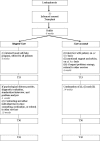Distress and quality of life after autologous stem cell transplantation: a randomized clinical trial to evaluate the outcome of a web-based stepped care intervention
- PMID: 20609251
- PMCID: PMC2913960
- DOI: 10.1186/1471-2407-10-361
Distress and quality of life after autologous stem cell transplantation: a randomized clinical trial to evaluate the outcome of a web-based stepped care intervention
Abstract
Background: Psychological distress (i.e. depression and anxiety) is a strong predictor of functional status and other aspects of quality of life in autologous stem cell transplantation following high-dose chemotherapy. Treatment of psychological distress is hypothesized to result in improvement of functional status and other aspects of quality of life. The aim is to evaluate the outcome of stepped care for psychological distress on functional status and other aspects of quality of life in patients with hematological malignancy treated with autologous stem cell transplantation.
Methods/design: The study is designed as a randomized clinical trial with 2 treatment arms: a stepped care intervention program versus care as usual. Patients are randomized immediately pre transplant. Stepped care and care as usual are initiated after a 6 weeks buffer period. Outcome is evaluated at 13, 30, and 42 weeks post transplant.In the experimental group, the first step includes an Internet-based self-help program. If psychological distress persists after the self-help intervention, the second step of the program is executed, i.e. a diagnostic evaluation and a standardized interview, yielding a problem analysis. Based on this information, a contract is made with the patient and treatment is provided consisting of individual face-to-face counseling, medication, or referral to other services. Care as usual comprises an interview with the patient, on ad hoc basis; emotional support and advice, on ad hoc basis; if urgent problems emerge, the patient is referred to other services.Primary outcome variables are psychological distress and functional status. Data are analyzed according to the intention to treat-principle.
Discussion: This study has several innovative characteristics. First, the outcome of the intervention for psychological distress in patients with hematological malignancy treated with autologous stem cell transplantation is evaluated in a randomized controlled study. Second, the impact of the intervention on functional status is evaluated: it is hypothesized that reduction of psychological distress results in improved functional status. Furthermore, the intervention concerns an Internet-based treatment in the first step. Finally, the intervention is characterized by an emphasis on self-management, efficiency, and a multi-disciplinary approach with nurses taking up a central role.
Trial registration: NTR1770.
Figures
References
-
- Felder-Puig R, di Gallo A, Waldenmair M, Norden P, Winter A, Gadner H. Health-related quality of life of pediatric patients receiving allogeneic stem cell or bone marrow transplantation: results of a longitudinal, multi-center study. Bone Marrow Transplant. 2006;38(2):119–26. doi: 10.1038/sj.bmt.1705417. - DOI - PubMed
-
- Goetzmann L, Klaghofer R, Wagner-Huber R, Halter J, Boehler A, Muellhaupt B. Psychosocial vulnerability predicts psychosocial outcome after an organ transplant: results of a prospective study with lung, liver, and bone-marrow patients. J Psychosom Res. 2007;62(1):93–100. doi: 10.1016/j.jpsychores.2006.07.023. - DOI - PubMed
Publication types
MeSH terms
LinkOut - more resources
Full Text Sources



